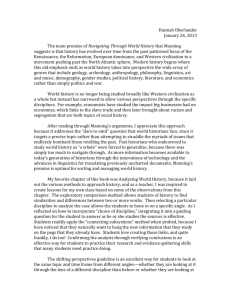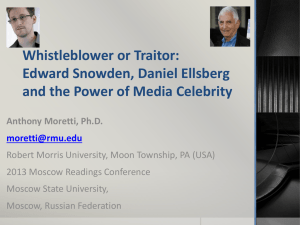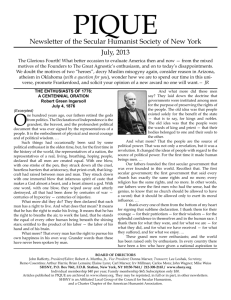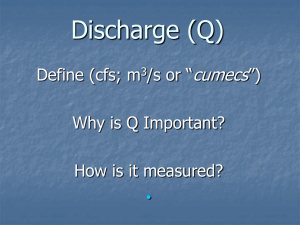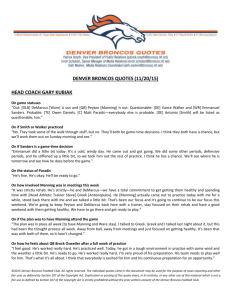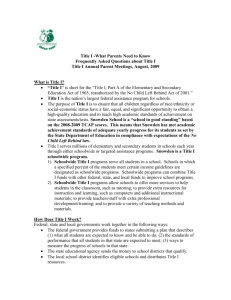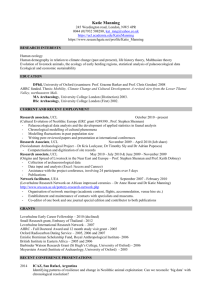National Security Case Studies
advertisement
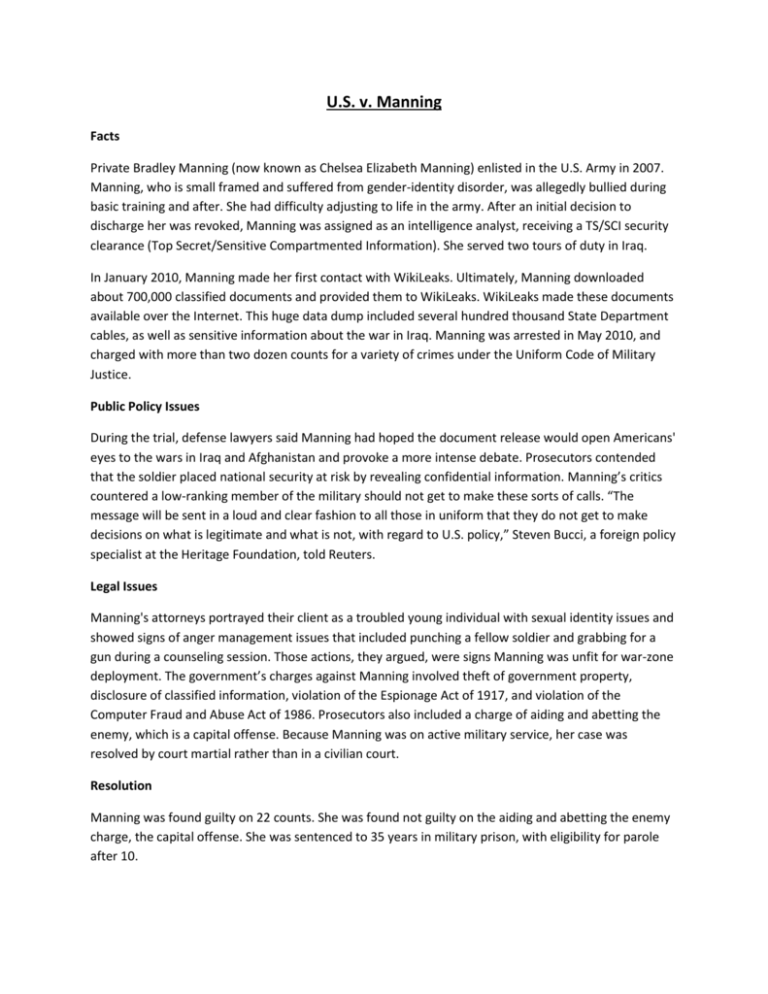
U.S. v. Manning Facts Private Bradley Manning (now known as Chelsea Elizabeth Manning) enlisted in the U.S. Army in 2007. Manning, who is small framed and suffered from gender-identity disorder, was allegedly bullied during basic training and after. She had difficulty adjusting to life in the army. After an initial decision to discharge her was revoked, Manning was assigned as an intelligence analyst, receiving a TS/SCI security clearance (Top Secret/Sensitive Compartmented Information). She served two tours of duty in Iraq. In January 2010, Manning made her first contact with WikiLeaks. Ultimately, Manning downloaded about 700,000 classified documents and provided them to WikiLeaks. WikiLeaks made these documents available over the Internet. This huge data dump included several hundred thousand State Department cables, as well as sensitive information about the war in Iraq. Manning was arrested in May 2010, and charged with more than two dozen counts for a variety of crimes under the Uniform Code of Military Justice. Public Policy Issues During the trial, defense lawyers said Manning had hoped the document release would open Americans' eyes to the wars in Iraq and Afghanistan and provoke a more intense debate. Prosecutors contended that the soldier placed national security at risk by revealing confidential information. Manning’s critics countered a low-ranking member of the military should not get to make these sorts of calls. “The message will be sent in a loud and clear fashion to all those in uniform that they do not get to make decisions on what is legitimate and what is not, with regard to U.S. policy,” Steven Bucci, a foreign policy specialist at the Heritage Foundation, told Reuters. Legal Issues Manning's attorneys portrayed their client as a troubled young individual with sexual identity issues and showed signs of anger management issues that included punching a fellow soldier and grabbing for a gun during a counseling session. Those actions, they argued, were signs Manning was unfit for war-zone deployment. The government’s charges against Manning involved theft of government property, disclosure of classified information, violation of the Espionage Act of 1917, and violation of the Computer Fraud and Abuse Act of 1986. Prosecutors also included a charge of aiding and abetting the enemy, which is a capital offense. Because Manning was on active military service, her case was resolved by court martial rather than in a civilian court. Resolution Manning was found guilty on 22 counts. She was found not guilty on the aiding and abetting the enemy charge, the capital offense. She was sentenced to 35 years in military prison, with eligibility for parole after 10. U.S. v. Snowden Facts Edward Snowden, who formerly worked as a system administrator for the Central Intelligence Agency (CIA) and as a counterintelligence trainer for the Defense Intelligence Agency (DIA), took a consulting job with Dell and then Booz Allen Hamilton, two private contractors that perform services on site for the National Security Agency (NSA). While working for these contractors at NSA facilities in Japan and then Hawaii, he collected information about the NSA’s global surveillance programs. On May 20, 2013, Snowden flew from Hawaii to Hong Kong, where in early June he revealed numerous classified NSA documents to journalists Glenn Greenwald and Laura Poitras. On June 9, 2013, four days after the first press articles, Snowden made his identity public. On June 14, the U.S. Department of Justice charged him with two counts of violating the Espionage Act and theft of government property. To avoid extradition to the United States, Snowden fled Hong Kong and boarded a flight to Moscow. He wound up stranded in a Russian airport after the United States revoked his passport. Ultimately, Snowden was granted temporary permission to stay in Russia, where he is today. Russia has rebuffed the U.S. government’s attempts to have him returned to the United States for trial. Public Policy Issues: Snowden’s supporters argue that he was acting in the public good and that the American public had a right to know about their government’s surveillance program, which included that data of citizens. The government counters that Snowden had a contractual obligation not to reveal the information he did, in any event, revealing classified information is illegal, and Snowden’s actions compromised national security and the United States’ ability to prosecute the War on Terror. Legal Issues: Snowden was charged with violation of: 18 U.S. 641 (theft of government property), 18 U.S.C. 793(d) (unauthorized communication of national defense information), and 18 U.S.C. 798(a)(3) (willful communication of classified communications intelligence information to an unauthorized person) Resolution: Snowden remains outside the United States’ jurisdiction, so the legal issues surrounding the case remain yet to be resolved. Department of Homeland Security v. MacLean Facts: Robert MacLean worked as an air marshal for the Transportation Security Administration (TSA). In 2003, the TSA sent MacLean and other federal air marshals a message canceling all missions on commercial flights if those missions would require the marshal to stay in the location overnight. The action was undertaken as a cost-saving measure. MacLean objected internally to the new policy, arguing it endangered the public by creating a class of flights on which there would never be an air marshal. When MacLean’s protestations were rebuffed by his bosses, he contacted an MSNBC reporter and leaked the new policy. MSNBC ran a story, after which, in light of a public outcry and congressional criticism, TSA was forced to reverse its policy. When it later came to light that MacLean was the source of the MSNBC story, he was terminated from his position as an air marshal. MacLean filed suit under the Whistleblower Protection Act (WPA). Public Policy Issues: MacLean argues his disclosure was protected under the WPA because he reasonably believed the new policy posed a substantial threat to public safety. The government counters that the information disclosed was sensitive security information, its disclosure violated the law, and whistleblowers are not entitled to legal protection under the WPA when they violate the law by disclosing information that is illegal to disclose. Legal Issue: The legal issue in the case is whether whistleblowers are entitled to protection when they disclose information that an agency rule prohibits them from disclosing, but no statute prohibits them from disclosing. (The ban against disclosing “security sensitive information” is an internal TSA rule.) MacLean’s defense team argues that a violation of an agency rule is not tantamount to a violation of law, and therefore an individual who makes such a disclosure is not barred from protection under the WPA. Resolution: This case is currently pending before the U.S. Supreme Court. A decision is expected this term.

